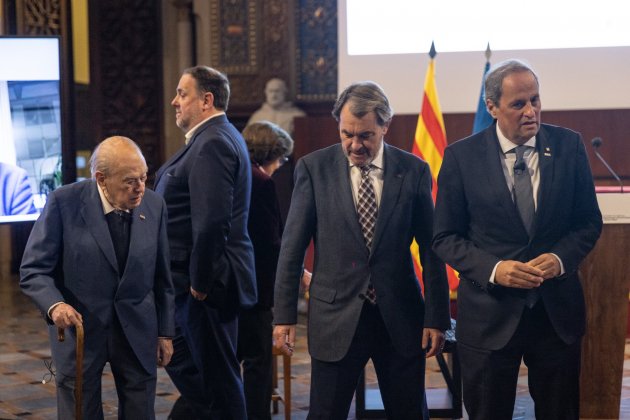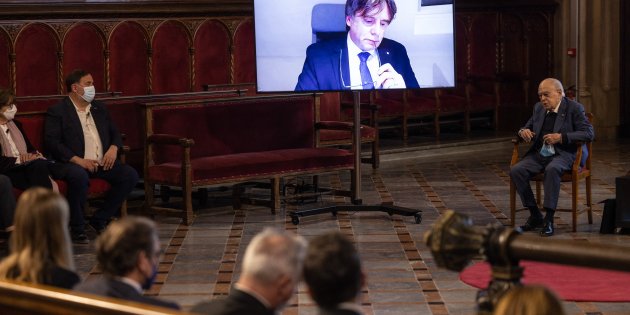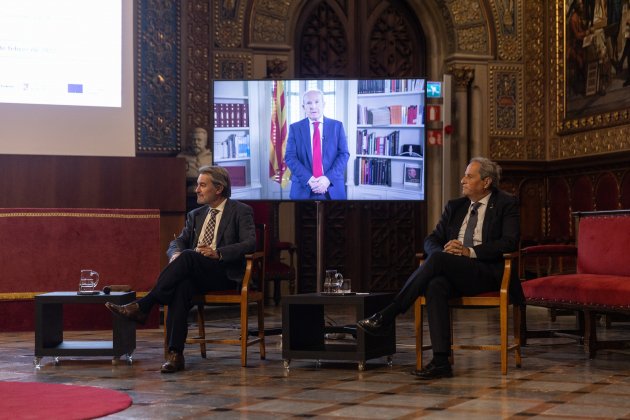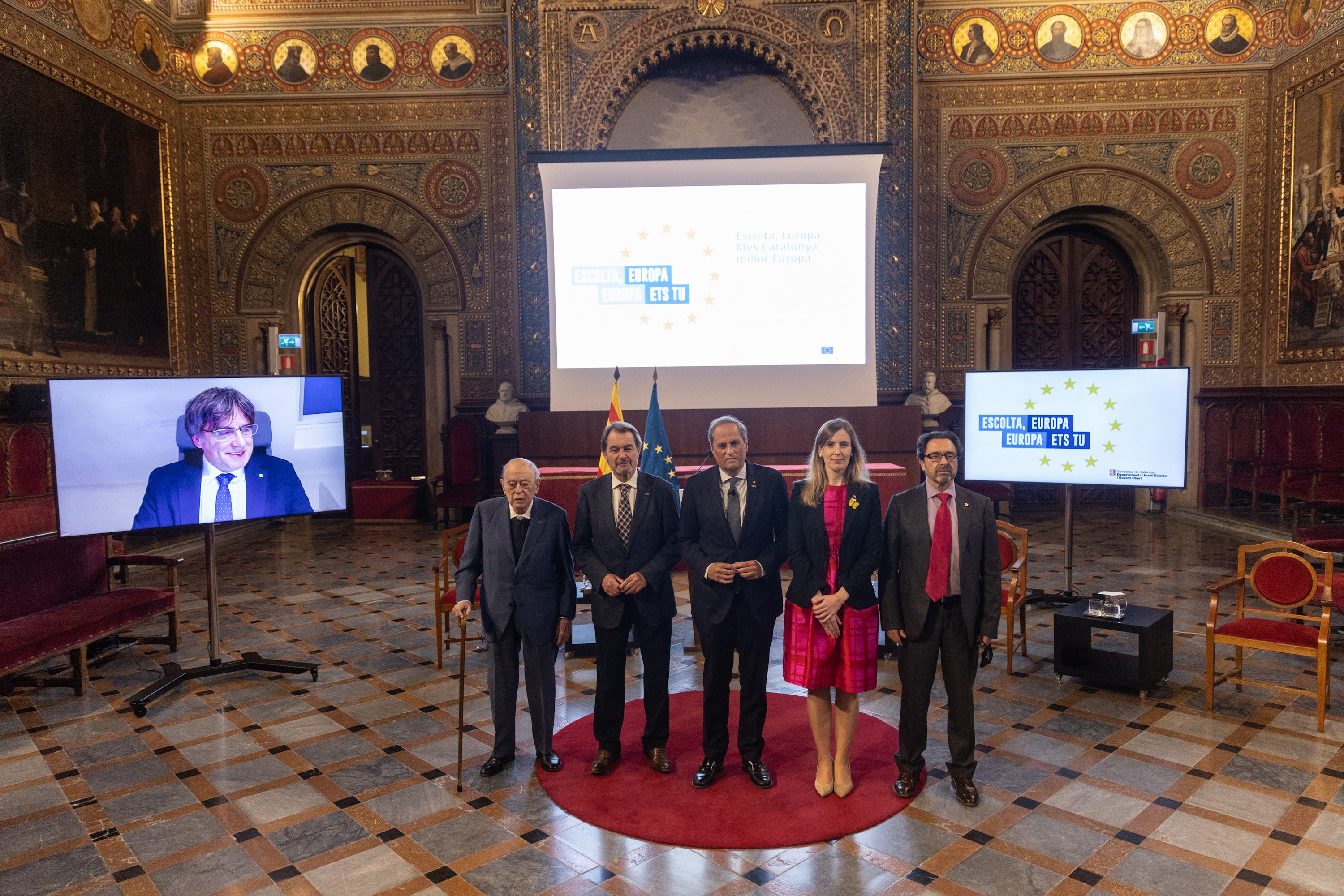The Catalan government has this evening asserted its place and its voice in the EU, putting on show the Europeanist vocation that the different executives of the Generalitat of Catalonia have pursued, beyond their political colour. The Catalan foreign minister, Victòria Alsina, convened the meeting with the presence of presidents Jordi Pujol, Artur Mas, José Montilla, Carles Puigdemont and Quim Torra, held at the Auditorium of the University of Barcelona, in which they spoke in person, by videoconference from exile or by video, and where all of them agreed, without hiding the shortcomings they saw, to stand up for Europe and the role within it that Catalonia must play. The current president, Pere Aragonès, did not take part, but the president of ERC, Oriol Junqueras, was present in a panel of MEPs from different legislatures of the European Parliament, in which Junts MP Toni Comín also spoke, along with the Socialist Joan Colom and the Christian democrat Concepció Ferrer.
In a speech with strong political assertions, Alsina closed the event affirming that, in the area of rights and values, the EU must move from theory to practice. The minister summarized in three points the demands that the Catalan government will raise in Europe: the recognition of Catalan as an official language in the European institutions; the promotion of a mechanism of clarity in the Union for “nations that, like the Catalan one, aspire to become a State and do not want to renounce the status of member of the EU”; and the protection of democratic values and the rule of law from possible violations, in the face of which she has called for Europe to avoid double standards and "not be afraid to punish those states that violate democratic values and the rule of law."

Jordi Pujol, Artur Mas and Quim Torra, in the foreground and Junqueras behind in the UB Auditorium / Sergi Alcàzar
The minister Alsina made it clear that the Catalan government's foreign demands and appeals to Europe have a continuity that runs through the governments of all the presidents who were there in the room, as well as president Pasqual Maragall, retired from public life as a result of his illness - "Catalan Europeanism could not be understood without him," said the minister, prompting the applause of those present. She quoted all of them, as well as the current president throughout her speech to strengthen the demands she was putting forward. "The image of unity that we have seen today marks a milestone and will be remembered," Alsina said.
Pujol's sympathy for Puigdemont
After many years of public silence, Jordi Pujol began his speech by confessing that he had prepared some notes but could not find them, so he had to improvise his speech, in which he evoked the origins of his Europeanism, which went back to when he was 16 years old. Pujol was applauded when he confessed that, despite some discrepancies, he contemplates with "sympathy, affection, and gratitude" the sustained action of president Puigdemont in Europe. Throughout his speech, the veteran politician said that there is a triple pressure on Europe: Russia - "every time Russia feels strong it expands, and when it is weak, it closes up," he warned - China and the United States, and with respect to these threats he warned that "Europe is in danger, it is powerful, but it is at a difficult point." Pujol's recipe for Europe is a certain spiritual and ideological rearmament. "You are lucky that I forgot my papers," the president joked at the end of his speech, hampered by the forgetting of his notes, but also by hearing problems.

Presidents Puigdemont and Pujol, and to the left, Oriol Junqueras / Sergi Alcazar
Carles Puigdemont, speaking via video conference, called for Euro-exigency, as an alternative to Euroscepticism or to the disappointment that Europe’s imperfections can cause. "If I can speak from here, it is because there is a European justice that prevails over the justice of the European states. If I had depended on the Spanish authorities, I would not be here", he argued from Waterloo, concluding that Catalonia has only one way to survive, which is Europe.
Mas, Montilla and Torra
Artur Mas recalled that during his tenure he saw the worst face of Europe, the crisis of 2008, the risk premium and the men in black who were walking around European capitals. "The recipe was austerity," he said. However, he said that this did not lead to any kind of anti-European reaction. In fact, he added, Europe is the big house in which Catalonia has a place. "Despite all the shortcomings, weaknesses and misunderstandings we see in the EU, the European project is a bit like health, you only value it when you don't have it or if you lose it," he said.

Presidents Mas, Torra and Montilla in the UB auditorium / Sergi Alcàzar
Quim Torra was the most critical. He recalled that he had assumed the presidency at a time when Catalonia could not govern itself as a result of the application of Article 155 and regretted that he did not receive the support of Europe. "I see that Europa is a club of states that I would love to join, but there are debates that have already been discussed," he lamented in relation to issues such as the presence of the Catalan language in the European institutions. Despite criticizing that Europe's response to the Catalan demands "has been null and void", he admitted that the legal response allowed protection of fundamental principles.
Via a video intervention, José Montilla, despite agreeing with the criticism of Europe's response to the 2008 crisis, made a positive assessment of European construction, as the most important space for progress. social model, economic integration and respect for the rule of law. The Catalan Socialist politician defended the role of the regions and cities in the construction of Europe and the imprint of Catalonia in the defence of principles such as subsidiarity. "We have also helped in this process of European integration," he said before concluding that he was committed to a future federalization of Europe as the most exciting project on the table.
Junqueras and Comín
Earlier, MEPs held a roundtable discussion in which Oriol Junqueras warned that the work of the European Parliament should be crucial, but that it is conditioned by the presence of other institutions. "We need a model that guarantees stronger common institutions and less intermediation by the states," he warned.
From Brussels, MEP Toni Comín, after overcoming technical difficulties in speaking at the event, warned that "the current model of European governance has reached its limits". Concepció Ferrer also defended the need for Europe to accept the diversity of the peoples that make it up, while the Socialist Joan Colom explained how his demands in defence of Catalan in Europe clashed with the fact that he is not present in the Congress of Deputies either.
At the end of the event, the minister Alsina said that Catalonia has been fighting since 1714 to be what it is, "against almost everything and almost everyone"; and she framed the European assertion within the tension with Spain, "especially since the collapse of the Catalan Autonomy Statute of 2010", when the Spanish state "did not listen to Catalonia" with a fiscal pact or the successive moments of the 2014 unofficial referendum, the 2015 plebiscite elections, or the referendum of October 1st, 2017. "Not only that. They suspended the autonomy, political and social leaders were imprisoned and others were forced into exile," she said. In the face of this, she affirmed that the people of Catalonia had not given up, "on the contrary", and have gone from "listening to Spain to listening to Europe".

